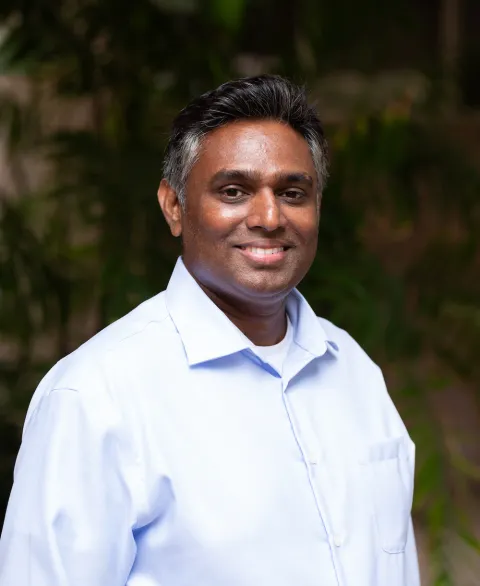Meet Lenoy Paul, MTM Class of 2024

Lenoy has a background in chemical engineering and has extensive experience in the life sciences industry, spanning biotechnology, medical devices, and clinical diagnostics. He has led business transformation, process improvements, and product implementations across multiple groups in operations, supply chain, and program management in both consulting and functional roles.
Q: Why did you want to join the MTM graduate program?
A: During and after the COVID pandemic, technological advances had taken center stage across industries and were not confined to just the hi-tech industry. This was especially true within the life sciences industry, the science of making medicines and healthcare, which was my professional background. So, I was looking for a program that would expose me to the latest in technology, not to teach me coding or programming, but one that combined technology, business, and human capital. My intention was to learn frameworks, understand how to help an organization by harnessing technology, and lead efforts for innovative change.
Q: What was something you learned that you look forward to using in your next job?
A: I came with clear expectations of what I wanted to learn from the program, and the Digital Transformation course proved to be exactly what I was looking for. I wanted to understand and learn about frameworks to utilize and implement relevant technologies in the real world, and the Digital Transformation course not only met that threshold, but also exceeded my expectations in many ways. For example, everyone talks about AI, many know what it means, some know that the technology has relevant use cases. But as leaders, how can we channel this new technology to make meaningful changes and sustain those changes across an organization? This is where frameworks are very useful. For example, we learned about the STEP framework (an acronym for Segmentation, Transition, Education, and Performance), which provides a structured process to evaluate and implement appropriate AI technology based on an organization's business needs.
Q: What was your field project and what skills did you use to solve this business challenge?
A: My field project was to help Deckers Brands, a locally based but large multinational apparel corporation, streamline its Go-to-Market process in order to reduce the time it takes for Deckers to bring its products to market. Our team utilized multiple learnings from the curriculum, such as market research, administering surveys, quantitative and qualitative data analysis, and team management, to understand Deckers’ processes, refine the problem statement, and propose solutions.
Q: What was your favorite part about going to graduate school in Santa Barbara?
A: As a student attending school with family, my favorite part about going to UCSB was the availability of campus family housing! I can’t say enough about this amazing resource available to students with families. It allowed me to have the peace of mind to focus on my coursework knowing that my family had a beautiful abode with exceptionally reasonable rent. This allowed us to enjoy the beautiful Goleta area and the beaches in town. Santa Barbara is obviously a very desirable area to live in and has the quintessential California vibe that I so adore.
Q: What roles or industries are you considering as you embark on the next stage of your career?
A: Ideally, my new role would provide the opportunity to combine my previous work experience, program leadership, and industry knowledge with the technology and team management principles from the MTM program, preferably in the life science industry.
Q: What is your favorite new technology?
A: In general, I gravitate toward technology that makes life easier for users and the public. One such use of technology that has made my life a lot simpler is cab-hailing services, such as Uber. It is so convenient to have a cab pick-up from wherever you are and drop you off at your destination without being charged an exorbitant fee. I am sure with the growth and adoption of AI, we’ll see a lot more of such applications personalized to customer needs. In my area of interest, healthcare, there’s already been a lot of push to use AI tools to help diagnose illnesses faster, which in turn can help a patient seek treatment, such as precision medicine, sooner and improve the chances for a better outcome.
Connect with Lenoy on LinkedIn: https://www.linkedin.com/in/lenoypaul/
Learn more about the Master of Technology Management graduate program here: tmp.ucsb.edu/mtm

 Instagram
Instagram LinkedIn
LinkedIn Twitter
Twitter